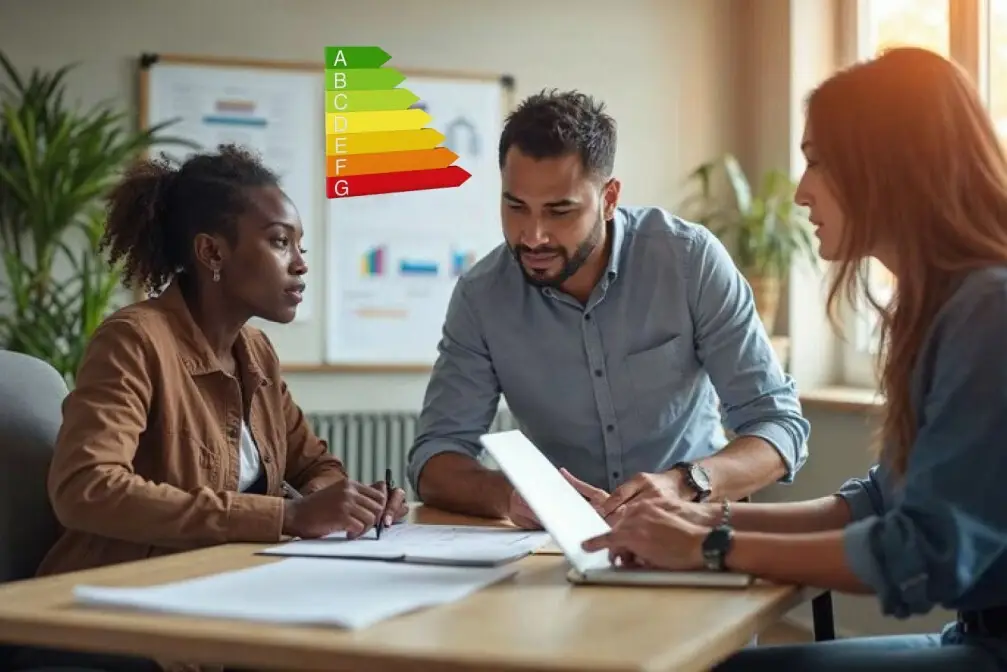Table of Contents
The ECO4 Scheme (Energy Company Obligation) is a major part of the UK government’s efforts to reduce energy consumption, alleviate fuel poverty, and promote sustainable living. The ECO4 Scheme not only updates heating systems but also directly impacts EPC (Energy Performance Certificate) ratings, ensuring long-term benefits for both households and the environment.
By improving EPC ratings, a measure of a property’s energy efficiency—households can reduce their energy bills significantly while contributing to the UK’s broader climate goals. The scheme’s reliance on government benefits for eligibility ensures that support is funneled to those who need it most, creating a fair and impactful solution to energy inequality.
This article explores all the aspects of eligibility criteria for the ECO4 scheme, which will enable you to meet all the requirements to get these grants. So, without further ado, let’s dig deeper into the details.
Which Outdated Heating Systems are Updated Under ECO4 Scheme?
The ECO4 Scheme aims to replace outdated and inefficient heating systems with modern, energy-efficient alternatives. Below is an overview of the heating systems targeted for replacement under the scheme:
- Non-condensing Gas Boilers
- Gas Fired Back Boilers
- Oil Boilers
- LPG Boilers
- Outdated Floor-Standing Boilers
- Storage Heaters
- Direct Electric Heaters or Fan Heaters
- Wood/Biomass Room Heaters
- Solid Fuel Heating Systems
- Electric Underground or Ceiling Heater
The updated modern systems consume less energy, reduce carbon footprints, and contribute to higher ratings, making properties more cost-effective and environmentally friendly.
Eligible Government Benefits for the ECO4 Scheme
Eligibility for the scheme is tied to various government benefits, to ensure support reaches those who need it most.
Below are some qualifying benefits that make households eligible:
- Income Based – Jobseekers Allowance (JSA)
- Income Related – Employment and Support Allowance (ESA)
- Income Support Allowance (ISA)
- Working Tax Credit (WTC)
- Child tax credit (CTC)
- Universal Credit (UC)
- Pension Guarantee Credit
- Pension Savings Credit
- Housing Benefits
The reliance on these income-based benefits ensures that the ECO4 Scheme remains a targeted and impactful solution, directly addressing the needs of society’s most disadvantaged.
Eligibility for Free Boiler Grants Under the ECO4 Scheme
This initiative directly supports the government’s goal of improving EPC ratings, reducing heating costs, and reducing carbon emissions to reach net-zero.
Here is the eligibility criteria you need to meet in order to get Free Boiler Grants:
- Benefit Recipient
- Homeowner or Tenants With Permission
- Boiler Installed Before 2005 (Non-condensing)
- Gas Metre Installed Before April 2022
- Eligible Property Style
- EPC Rating D or Lower
If you qualify, applying for a free boiler grant is an opportunity to improve your property and reduce your energy bills significantly.
Eligibility for Air Source Heat Pump Grants Under ECO4 Scheme
The ECO4 Scheme provides an opportunity for households without existing central heating systems to install modern, energy-efficient solutions.
To qualify for first-time central heating grants, applicants must meet the following eligibility criteria:
- Boiler System Installed Before 2005
- Benefit Recipient
- Homeowner or Tenants With Permission
- Eligible Property Style
- Epc Rating D or Lower
However, some conditions like demographic limitations, insulation standards, and existing heating systems may apply.
Eligibility for Insulation Grants Under the ECO4 Scheme
To qualify for insulation grants under the ECO4 Scheme, applicants must meet the following eligibility criteria:
- Benefit Recipient
- EPC Rating D or Lower
- Homeowner or Tenants With Permission
Insulation grants have more flexible criteria than other home heating grants, which allows more vulnerable households to take advantage of these government schemes. Plus, there are multiple types of insulations available to make your homes energy efficient and more comfortable.
Check Your Eligibilty!
Types of Insulation Covered
Every household has different energy requirements as per their insulation requirements. Some houses are already insulated when they are built in the first place, while we need to insulate some afterwards.
The ECO4 scheme typically cover a range of insulation grants types to suit different property needs:
- Loft Insulation: Reduces heat loss through the roof, improving overall energy efficiency.
- Cavity Wall Insulation: Fills gaps in walls to prevent heat escape, suitable for properties with cavity walls.
- Solid Wall Insulation: Insulates external or internal walls of older homes with no cavities.
- Floor Insulation: Minimises heat loss through ground floors in properties.
- Room-in-Roof Insulation: Ideal for homes with converted loft spaces or attic rooms.
All types of insulations mentioned above are covered under this scheme to save your households from every type of energy wastage or uncomfortable temperatures.
How the ECO4 Scheme Helps Improve Your EPC Rating
The Energy Performance Certificate (EPC) rating, which ranges from A (most efficient) to G (least efficient), is a key indicator of a home’s energy efficiency. Improving an EPC rating not only reduces energy bills but also increases property value and supports environmental goals. The ECO4 Scheme plays a pivotal role in enhancing EPC ratings for homes with low energy performance, particularly those rated D, E, F, or G.
Key Ways the ECO4 Scheme Elevates EPC Ratings
The scheme focuses on three main areas to transform energy performance:
1. Modernising Heating Systems
Outdated heating systems are a major contributor to poor EPC ratings. By replacing inefficient systems like non-condensing boilers or electric heaters with advanced alternatives, the scheme ensures homes use energy more efficiently. Modern systems are better at converting fuel into heat, significantly reducing energy wastage
2. Improving Insulation
Heat loss through walls, roofs, and floors is a primary reason for energy inefficiency. The ECO4 Scheme provides grants for various types of insulation, including cavity wall, loft, and floor insulation. By sealing these energy leaks, homes retain warmth during colder months, reducing the need for excessive heating.
3. Introducing Renewable and Sustainable Energy Solutions
The scheme also promotes the use of renewable energy technologies, such as air source heat pumps. These systems rely on sustainable energy sources, reducing dependence on fossil fuels and directly contributing to higher EPC ratings.
Why Improving EPC Ratings Matters
Where EPC ratings are considered the standard to measure the energy efficiency of your houses, it also offers multiple benefits that you can unlock by improving these ratings for your households.
A higher EPC rating offers long-term advantages for homeowners and tenants:
- Economic Benefits: Homes with better EPC ratings cost less to maintain and are more attractive to buyers or renters.
- Regulatory Compliance: Meeting higher EPC standards aligns with evolving government regulations aimed at achieving net-zero emissions.
- Energy Independence: Efficient homes are less vulnerable to rising energy prices, providing stability for low-income households.
Apart from these benefits, EPC ratings also play an important role in measuring your eligibility for the ECO4 scheme. You should often get it checked, in order to stay ahead of the curve and comply with the regulatory requirements.
Conclusion
The ECO4 Scheme represents a transformative opportunity for households to improve their EPC ratings, reduce energy costs, and embrace sustainable living. By addressing outdated heating systems, improving insulation, and supporting modern energy-efficient technologies, the scheme provides a comprehensive solution for low-income and vulnerable households.
If your home struggles with energy inefficiency or rising heating costs, the ECO4 Scheme could be the answer. Connect with authorised providers like Grant Boilers today to explore how the scheme can transform your home and lower your energy bills.
This comprehensive guide has served the purpose of providing you required information regarding ECO4 scheme eligibility criteria. Reading this article will help you apply all energy efficiency measures as per your requirements.
Frequently Asked Questions
What Types of Properties Are Eligible for ECO4 Grants?
Here is the list of eligible property types to get energy efficiency measures under the ECO4 scheme:
- Flat Bungalow
- Terraced End
- Terrace
- Semi-Detached
- Detached
Only park homes and council properties are not eligible for energy efficiency upgrades under the ECO4 scheme.
What Documents Are Required for the Application?
Here are the required documents to apply for the ECO4 scheme grants:
- Proof of property Ownership (If owner is applying)
- Permission from the Landlord (If a tenant is applying)
- Proof of Income
- Energy Performance Certificate with a D or lower rating
There might be some other documents required such as a government-issued ID, so keep it prepared.
How Long Does the Application Process Take?
It depends on the scope of work and complexity of the project. The initial assessment from the installer may occur within a few weeks. Once the application gets approved, it may take a few days or weeks for the installation. Typical overall time takes 4-8 weeks to complete.



